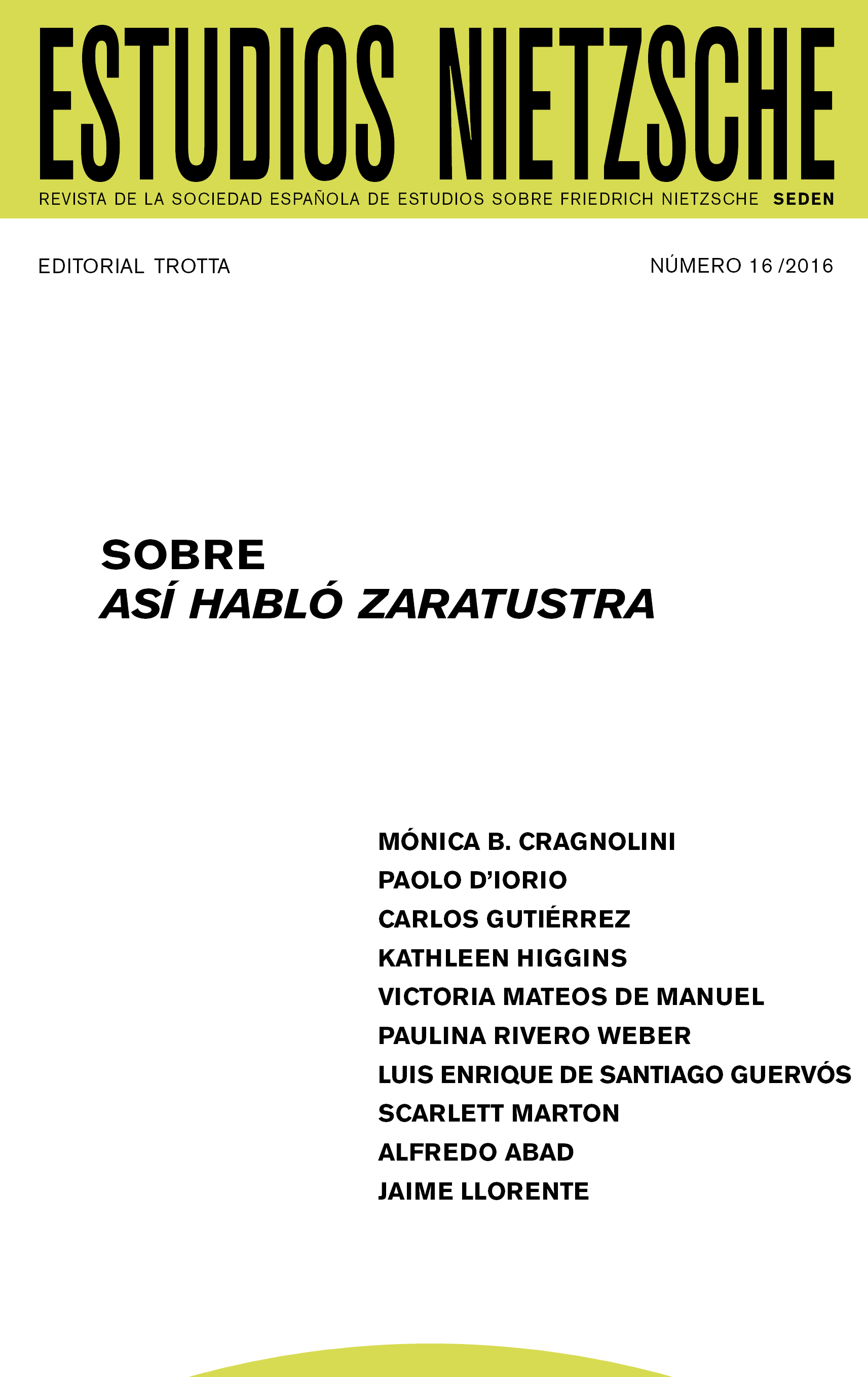The eternal recurrence, «the basic conception of Zarathustra»
DOI:
https://doi.org/10.24310/EstudiosNIETen.vi16.10820Keywords:
Zarathustra, eternal recurrence, overman, will to power, transvaluation of the values, amor fatiAbstract
In Ecce homo, Nietzsche states that the basic conception of Thus spoke Zarathustra consists in «the idea of eternal recurrence, the highest formula of affirmation that can possibly be attained». Taking as a point of departure the analysis of the different parts of this book, first of all we intend to define the place of the thought of eternal recurrence. Establishing the relation of this thought with the notion of overman, the concept of will to power, the project of transvaluation of the values, and the idea of amor fati, we plan to
examine the way Nietzsche conceives it in Thus spoke Zarathustra. Then we aim at evaluating to which extent the thought of eternal recurrence consists in the highest acceptation ofthe world as it is.
Downloads
Metrics
References
Busellato, S., (org.), Nietzsche dal Brasile. Contributi alla ricerca contemporanea, Pisa, Edizioni ETS, 2014.
Marton, Sacrlett, « Nietzsche et sa recherche d’interlocuteurs : une analyse du prologue d’Ainsi parlait Zarathoustra », en C. Denat et P. Wotling (orgs.), Nietzsche. Un art nouveau du discours, Reims, Épure, 2013, p.81-101.
Marton, Scarlett, « Ainsi parlait Zarathoustra : l’œuvre à la fois consacrée et reniée », en G. Campioni, L. P. Ciamarra, M. Segala (orgs.), Goethe, Schopenhauer, Nietzsche. Saggi in memoria di Sandro Barbera, Pisa, Edizioni ETS, 2011, p.481-498.
Marton, Scarlett, « À la recherche d’un critère d’évalution des évaluations. Les notions de vie et de valeur chez Nietzsche », in C. Dénat et P. Wotling (orgs.). Les hétérodoxies de Nietzsche. Lectures du Crépuscule des idoles, Reims, Épure, 2014, p.321-342.
Nietzsche, F., Obras Completas, I-IV (OC ). Director ed. Diego Sánchez Meca. Madrid: Tecnos, 2011-2016
Nietzsche, F., Correspondencia I-VI. (CO). Director ed. Luis E. de Santiago Guervós. Madrid : Trotta, 2005- 2012.
Nietzsche, F., Fragmentos Póstumos I-IV (FP). Director ed. Diego Sánchez Meca. Madrid: Tecnos, 2006-2010.
Downloads
Published
How to Cite
Issue
Section
License

This work is licensed under a Creative Commons Attribution-NonCommercial-ShareAlike 4.0 International License.
As of issue 21 (2021) this journal is published only in open access (diamond route).
From that number 21, like the previous numbers published in NIETZSCHE STUDIES, they are subject to the Creative Commons Acknowledgment-NoComercia-ShareIgual 4.0 license, the full text of which can be consulted at <http://creativecommons.org/licenses/by-nc-sa/4.0 >
It is the responsibility of the authors to obtain the necessary permissions of the images that are subject to copyright.
This work is licensed under a Creative Commons Attribution-NonCommercial-ShareAlike 4.0 International License.
Copyright generates two different rights: moral rights and patrimonial rights that EJFB recognizes and respects. Moral rights are those relating to the recognition of the authorship. They are rights of a personal nature that are perpetual, inalienable, unseizable and imprescriptible as consequence of the indivisible union of the author and his/her work.
Patrimonial rights are those that can be derived from the reproduction, distribution, adaptation or communication of the work, among others.







11.png)
